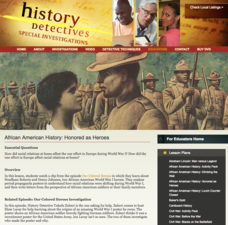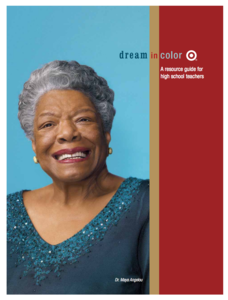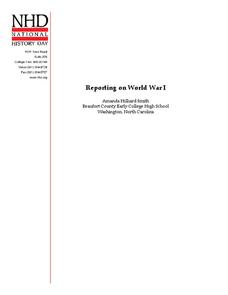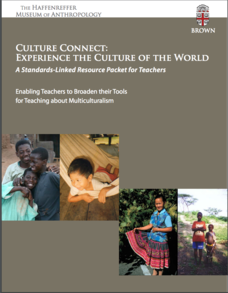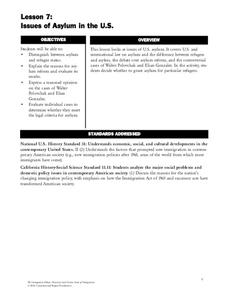Smithsonian Institution
Women's Role in the War Effort
Did you know that many women were Confederate spies during the Civil War? The resource focuses particularly on the important role women played for both the Union and Confederacy. It uses exercises such as a discussion, video, analyzing...
National History Day
Why Did the United States Enter World War I in 1917?
World War I was the first major conflict on a global scale. Using primary documents, learners determine why the United States chose to enter World War I when it did. After analytical writing and group research, the causes of America's...
PBS
African American History: Honored as Heroes
To gain an understanding of the treatment of African American soldiers during World War I, class members watch an excerpt from the History Detectives film, Our Colored Heroes, and then examine three recruitment posters from that time...
Facing History and Ourselves
Life for German Youth in the 1930s: Education, Propaganda, Conformity, and Obedience
The German youth faced an onslaught of propaganda when they went to school, thanks to the Nazi regime led by Hitler during World War II. Pupils relate their education experiences to German youth by analyzing primary source readings,...
US Holocaust Museum
Time Capsule in a Milk Can
Imagine dumping out a milk can and finding letters from one of the darkest moments in history! Scholars use Holocaust Reading Passages and research to discover how people recorded and hid history during the events of World War II. They...
National Endowment for the Humanities
People and Places in the North and South
North and South: two opposite directions and two opposite economic and social systems in time of the Civil War. Pupils peruse census websites and primary source photographs to understand what life was like for the everyday person before...
Constitutional Rights Foundation
History of Immigration From the 1850s to the Present
The Statue of Liberty may embrace the huddled masses of the world, but has American society always joined in? After young historians read a passage about the history of American immigration in the 19th and 20th centuries, focusing on...
CHPCS
The United States in the 1920s: The New Negro Movement and the Harlem Renaissance
Music, writing, and activism all tell the story of history! The resource uses these elements and more in a presentation to discuss the Jazz Age and Harlem Renaissance. Your class views biographies, discusses important events, and...
Poetry Foundation
Dream in Color - High School
Whether focusing on African American poets, Black History Month, or the poetic experience, an amazing toolkit that encourages learners to develop unique poetic voices deserves a place in your curriculum.
National Endowment for the Humanities
Courage “In the Time of the Butterflies”: A Common Core Exemplar
The courage of Las Mariposas, the Mirabal sisters, is the focus of a series of activities designed to accompany a reading of In the Time of the Butterflies that ask readers to consider what it means to be courageous. Beautifully crafted...
Facing History and Ourselves
The Weimar Republic: Historical Context and Decision Making
Did you know that way before Hitler became a dictator, he actually spent nine months in a German jail? Provide the background for the escalating point before the Nazi party took over in World War II through the exercises in the resource....
EduGAINs
Governmental Apology for the Aboriginal Experience—Canadian and World Studies
What constitutes an effective apology? After considering a series of scenarios, class members develop criteria for an effective apology and then use these indicators to evaluate Canada's Prime Minister Harper's apology to former...
Core Knowledge Foundation
Early World Civilizations Tell It Again!™ Read-Aloud Anthology
Ancient world civilizations are the focus of a read-aloud anthology. First graders explore the early world of Mesopotamia, Babylon, the sphinx, and pyramids, get to know people of the Nile, Hatshepsut, and Tutankhamun, and examine world...
Curated OER
Compare and Contrast Timelines of the World
Seventh graders create a classroom timeline of important world events. This lesson is meant to be used during the entire school year. As the school year goes along, events are added to the timeline as chosen by the class. The events are...
Virginia Department of Education
World History and Geography to 1500 A.D.
Here's a great resource for your curriculum library. The 240-page packet, organized into units by topics, includes sample lesson plans, links to primary and secondary source documents, worksheets, activities, and sample assessments.
New York City Department of Education
Geography and Early Peoples of the Western Hemisphere
Young historians discover the early people of the western hemisphere. The unit explores how the land changed, how it was used and homes of early Americans such as Incas, Mayans, Inuits, Aztecs, and Pueblos. Individuals also examine these...
National History Day
Reporting on World War I
Throughout history, newspapers have reported the events of the day as they unfolded. Using primary and secondary sources from World War I, scholars uncover how the American people learned of the events of the War to End All Wars. History...
BW Walch
Wondering About the New Seven (Man-Made) Wonders of the World
Who determines the Seven Wonders of the World, and what criteria is used to evaluate these locations? Discover the efforts to promote cultural diversity and preserve man-made monuments during the world's first-ever global vote in 2007 to...
Stanford University
Lesson Plan: The Children's Crusade and the Role of Youth in the African American Freedom Struggle
Young people played significant roles in the Civil Rights movement. Class members examine the contributions of Barbara Johns, Claudette Colvin, Mary Louise Smith, and the children of Birmingham,...
Curated OER
Pocumtucks in Deerfield
As part of a study of colonial and Native American history, class members focus on the beliefs and land use of the Pocumtucks, who settled near Deerfield, Massachusetts. Students examine their beliefs about land use and ownership, the...
Carolina K-12
Comparing Slave Trades: A Study of the Transatlantic and Trans-Saharan Slave Trades
While most people are familiar with the transatlantic slave trade, there is less knowledge of another major external African slave trade in world history: the trans-Saharan slave trade. Pupils work in groups to read informational texts...
Queen's Printer for Ontario
Evaluating Wartime Posters: Were They Good Propaganda?
"Back Him Up!" Scholars will analyze how World War I posters displayed, on the home front, often attempted to stir up emotions. As they examine the different ways people used propaganda posters during the war, they will create their own...
Brown University
Culture Connect: Experience the Culture of the World
A rich series of activities introduces learners to the concept of culture by closely examining the behaviors, practices, and art of three distinct peoples: the Highland Maya of Guatemala, the Hmong of China and Southeast Asia, and the...
Constitutional Rights Foundation
Issues of Asylum in the U.S.
Who gets to come to the United States? Examine cases of individuals seeking asylum with an informative reading passage that includes examples, statistics, and representations of public opinion regarding asylum. Groups then go on to...




